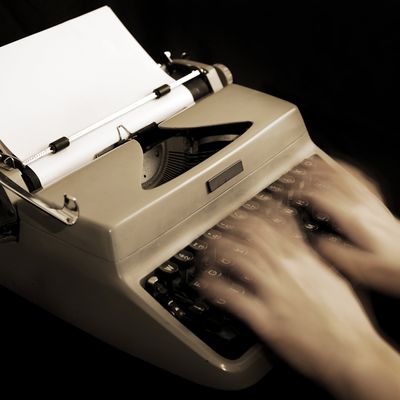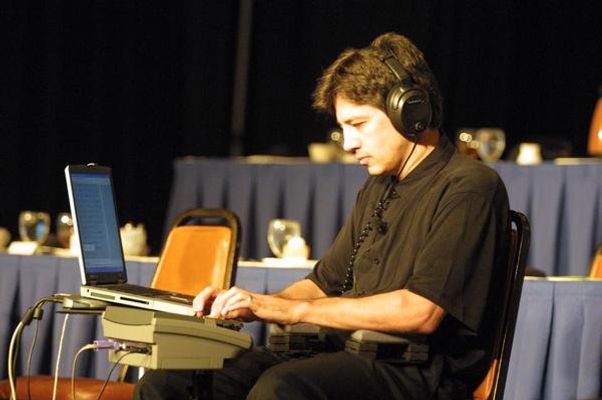
A decent typist can do 80 words per minute. Mark Kislingbury can hit more than four times that speed. He’s the fastest in the world, and getting faster. The 53-year-old Texan holds the world record for the “fastest real-time court reporter,” a standard he set in 2004 when he transcribed a staggering 360 words in one minute, with 97 percent accuracy.
If you’ve ever watched a trial in a courtroom, you’ve probably seen a court reporter, sometimes called a stenographer, sitting near the witness stand and quietly typing away, making an official record of every word that’s uttered.
In order to keep up with the speed of human speech for hours on end, court reporters use a special keyboard — a steno machine — that allows them to type whole words and phrases in single strokes. For years now, Mark Kislingbury has been the master of the craft.
Kislingbury is the most decorated champion of the annual competitions put on by the National Court Reporters Association, the winner of seven speed contests and four “real-time” contests — a slightly slower event focused more on accuracy. Between 2001 and 2010, he won the championship seven times, becoming known as the Michael Jordan of court reporting.
Now, 12 years after he set his world record, he’s gunning for another history-making run. He’s training to go even faster, and hoping to hit 370 words per minute in the near future.
In an interview this week from his home in Houston, he compared court reporting to being a professional athlete or concert pianist, quoted Aristotle on how to achieve excellence, and shared his choice for best steno machine.
(You can see him in action about 45 seconds into this trailer for the court-reporting documentary For the Record.)
Tell us about your world record!
I wrote 360 words a minute for one minute, transcribing at 97.23 percent accuracy. It was an annual convention of the National Court Reporters Association. In July 2003, I tried for the record, but my accuracy level wasn’t good enough. We tried it again one year later. In court reporting we have this arbitrary number of 95 percent accuracy, which we consider a pass. Below that we consider it a fail. I managed to get higher than 95 percent. I had done 92 and a half the year before.
After you missed the record the first year by just a couple of percentage points, what did you do to get your accuracy up?
When I fell short, I knew what I had done wrong. I knew that I needed to give 100 percent in every practice session. I was confident that if I did that, I’d be able to get it. My practice sessions were kind of a unique method. I’ve developed a formula for practicing that involves practicing 25 percent higher than the speed you’re trying to master. I practiced at about 450 words a minute for most of that year for five-minute stretches, three-minute stretches, seven-minute stretches. I just made sure I gave it my all. That was enough so that 360 seemed slow. My body was so used to struggling at 450.
How did you first get into court reporting? What inspired you to devote yourself to this?
I was a junior in high school in a class they had back then called Gregg Shorthand. I thought it would help me take notes better in college. A rep from the local court-reporting school showed up to give a presentation, and she put a machine on the table. It was olive green with shiny black keys that weren’t labeled, and I fell in love with the machine. God made me fall in love with it, kind of like some kid might fall in love with the piano. The machine is just so mysterious. When you type, it comes out in a code language, and I always liked codes. It just seemed like it would be really neat to write what someone says in code.
A steno machine has just a couple of rows of unlabeled keys. How does it work? And how can you type so many words so fast with that thing?
There are 23 keys on the steno-machine keyboard, including four vowel keys at the bottom, and a bar at the top called the number bar. You start a syllable on the left and end it on the right. So if I were to type “Tom,” I’d type a “T” on the left, an “O” vowel key, and two keys to produce an “M” on the right side. But you push them all at once. That’s where the speed comes in. Some people literally write every syllable. The reason I’m so fast is that I don’t write every syllable. I memorize a shortcut for each common name, phrase, word. For instance, “responsible” would be four syllables, but I write “SPIBL.” That’s my way of writing “responsible.” I have to memorize a lot. Other people don’t; they just have to listen to words and type the syllables.
Your fingers just physically top out on any keyboard — you’re going to hit that top speed of how many pushes you can do in a second. Since I’m doing whole words and groups of words instead of syllables, when I top out, I’m typing more words per minute. I might have memorized 100,000 unique short forms, like “SPIBL.” For example, I can write “how many” as “HOUM” and “how long” as “HOUNG.”

Lots of court reporters can transcribe quickly. How did you become the fastest?
When I went to court-reporting school in 1981, I was very lucky that I was taught the shortest shorthand system being taught in schools at that time. Then when I graduated, I was inclined to continually invent shortcuts for words and phrases, which made me faster and my job easier. When I started winning real-time contests in 1999 and after, I realized it was because I wrote shorter than the other people, not because I had more talent. It’s mostly the system I use and the hard work I put toward that system. It’s pushed me past people that I’m sure are more talented than I am. So, it seems to me that my world record of 360 words per minute is pretty much untouchable by other court reporters right now, unless they change the way they write and shorten the same way I did. Currently I’m working on a new run for breaking my own world record. I’m going for 370. I’m training right now, and I do believe that sometime in the near future, maybe a year, maybe a year and a half, I will break 370.
What does it feel like to compete? What are you thinking about when you’re going that fast?
It has to be automatic. You’re not thinking your way through it, you’re just reacting. It’s like any other athletic endeavor, whether it’s ice skating or anything. Your body has to know how to do it and your brain gets out of the way. Those words are coming very fast, and your body is reacting because it’s just done this so many times. But it’s new things coming at you that you may not have heard before. Playing piano is an amazing skill. But the one thing that makes what we do in this sense harder than piano — in piano, they know what they are going to play next. We court reporters don’t know what’s coming next. We don’t have a clue, out of the many thousands of English words, what they’re going to say next.